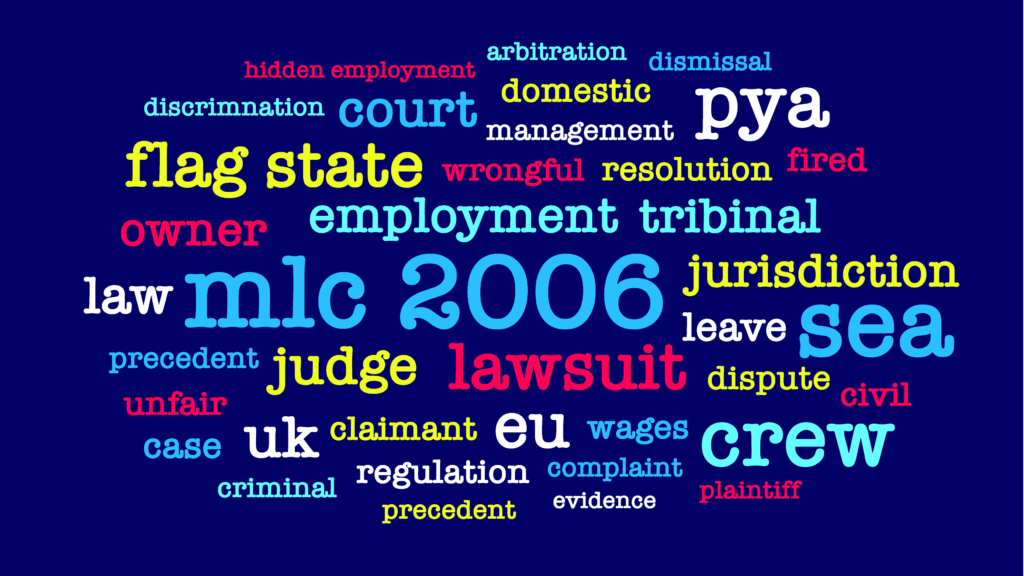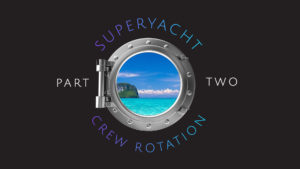It is without doubt that we have seen some significant improvements in employment of yacht crew over the last decade or so and, on the whole, they fare very well compared to many working on commercial ships. Unfortunately, disputes still do arise and, if it cannot be resolved amicably, legal action may be necessary.
With that in mind, a recent UK Employment Tribunal hearing raises some interesting questions for both owners and crew. The case involved a claim of unfair dismissal; however, the preliminary hearing was not to judge the merits of the case, but to ascertain whether the UK Employment Tribunal had jurisdiction over the claim.
The case involved a captain who was not a UK resident, working on a Cayman Islands flagged and owned yacht that spent time in UK waters, the captain was employed via a Guernsey employment company and the yacht was managed by a company based in France. His employment agreement also expressly stated that it was based on Guernsey law and that all parties would submit to Guernsey jurisdiction in matters relating to the agreement.
As per most maritime employment claims, a rather complex mix of parties and jurisdictions were involved. In this example, based on the submissions of the claimant and plaintiff, and case law, the decision was that it could be heard by a UK Employment Tribunal and, interestingly, despite the ownership structure, the judge also determined that the ‘effective owner’ was resident in the UK.
This raises some questions, such as; do the common employment practices provide the necessary protections for crew in the event of a dispute? And, is the protection often cited for owners, as robust as some would suggest?
In the past it was quite common for crew to be employed without employment contracts, I certainly never had one in the first 20 years of my time in the industry. But, with the growth in management companies and the introduction of the Maritime Labour Convention 2006 (MLC) Seafarers Employment Contracts (SEA) became the norm for Commercial yachts – with many Private yachts adopting the format of SEA for their crew.
Putting MLC to one side for the moment, one of the reasons why it was recommended that owners use an offshore employment company, was to distance the crew (Employee) from the owner (Employer) in order to limit the latter’s liabilities. With the introduction of MLC, an added advantage in using an offshore employment company in a sympathetic jurisdiction, was to minimise the number of social protections required by MLC – a minimum of 3 are required out of a total of 9 branches, which can be covered by insurance or National schemes – thereby, reducing liability and costs for an owner.
Under MLC there is a requirement for a connection between the Shipowner and the Employer; an SEA can only be signed by an Employer if they have authority from a Shipowner and there is evidence of that authority e.g. Power of Attorney – a ships Master can also sign. Those who are authorised should be noted in DMLC Part II. So, in the case of an MLC compliant yacht, there should always be a contractual link between Crew (Employee) and Shipowner.
Depending on the agreement, a management company who has taken on the responsibility for the management and operation of a yacht, could also be the ‘Shipowner’ under MLC – a similar definition as ‘Company’ as per STCW and the ISM Code.
“As per Article II.4 of MLC, many flag States exclude pleasure yachts ‘not ordinarily engaged in commercial activity’”
As per Article II.4 of MLC, many flag States exclude pleasure yachts ‘not ordinarily engaged in commercial activity’ (defined as Private throughout the rest of this article) from their enactment of MLC. Therefore, it is important to understand that SEA’s issued by Private yachts will not be MLC compliant unless a yacht has the necessary MLC certificates. And, if a yacht is not compliant, the SEA’s will probably fall outside the jurisdiction of flag State law. Even if a Private yacht is compliant, there are still questions about jurisdiction if they are expressly excluded from flag State legislation.
I believe some flag States are making progress towards making SEA’s compulsory for Private yachts, which will be a good thing however, they will also need to have a legal framework in place to provide the necessary oversight and enforcement powers. I wonder how easy that will be without upending the whole concept of Private yacht ‘voluntary compliance’ with MLC and other maritime codes and conventions?
In the meantime, perhaps Private yachts should rename their agreements simply as a Crew Employment Agreement (CEA) to avoid confusion and legitimacy with an MLC SEA?
Irrespective of whether yachts are Private or Commercial, where used, SEA’s have no doubt improved employment by the provision of a contract detailing the terms and conditions such as salary, leave, repatriation, notice period, working hours, sickness benefit, etc. – this has been a very positive advance. However, there is still a perception within the industry that crew feel there is little they can do in the event of an employment dispute.
Indeed, to illustrate this point, the Professional Yachting Association in a recent article stated:-
“In reality, there is no job protection in yachting, and anyone can be fired at any time, without reason.” (PYA What to do when things go wrong – 27 Aug 2019.
It is likely that readers will have some knowledge of situations where owners, management companies and, yes, captains as well, have dismissed crew for a variety of reasons that would not withstand scrutiny under most domestic employment laws where there are better protections against such things as:-
- Unfair dismissal – e.g. no reason given or, reason not one of those described within SEA or crew handbook.
- Wrongful/constructive dismissal – e.g. forced to resign due to a breach of employment law or SEA, such as lack of due process, discrimination, sexual harassment, salary or leave disputes.
On many occasions crew are ‘persuaded’ to resign rather than being fired due to a belief it is better for their future employment prospects – this could be judged as constructive dismissal.
The latter point, along with the lack of clarity on the legal protections and jurisdiction, is probably why there may be a reluctance to make a claim; crew fear they may be labeled a ‘troublemaker’ and it might affect their career. This feeling is not limited to yachting, it also applies to shipping as highlighted in the EU report “Service contract regarding a study on the implementation of labour supplying responsibilities pursuant to the Maritime Labour Convention (MLC 2006) within and outside the European Union – Final Report October 21, 2015”. And, although ‘blacklisting’ is illegal, there is plenty of evidence to suggest it goes on within our industry.
It should be noted that most countries have time limits and qualifying periods of employment as prerequisites in employment disputes, particularly unfair dismissal However, if a case involves acts that are contrary to certain specified rights or civil liberties, e.g. discrimination, sexual harassment, etc. such time limits and qualifying periods may not apply, additionally, such cases may raise the possibility of criminal prosecution. It is therefore important to obtain the proper legal advice.
As alluded to previously, not helping matters is the confusion over the appropriate jurisdiction given the number of parties and administrations involved and their domestic, international and maritime laws: –
- The Flag State (FS)
- The Yacht Owning Company (YOC)
- The ultimate beneficial owner (UBO)
- Employment Company (EC)
- Management Company (MC)
- Employee
“UNLCOS and UNCTAD state that a Flag State has “jurisdiction and control in administration, technical and social matters of ships flying its flags”
Although International conventions such as UNLCOS and UNCTAD state that a FS has “jurisdiction and control in administration, technical and social matters of ships flying its flags,” it is not always the case that they have the necessary motivation, resources or legal framework to provide an effective forum in the event of an employment dispute. And although we mainly use ‘white list’ high-quality flags within the yachting industry, some may have less favorable employment laws for seafarers – beyond that of MLC, if applicable – and crew may find them to be unsympathetic or lacking any enforcement power when it comes to employment disputes.
Employment companies, depending on their residency, and despite what may be stated in a SEA, may also not have the necessary laws in place to hear maritime employment disputes e.g. their employment laws may not apply to non-residents.
Given the above, it’s not surprising that there is a perception that crew feel that the odds seem stacked against them and there is little they can do.
This brings me back to the case mentioned at the beginning.
This case clearly demonstrates that, depending on the circumstances, motivated crew with the right legal advice and support can find a suitable forum and jurisdiction. In this case the UK Employment Tribunal, through domestic employment law and, EU REGULATION (EU) No 1215/2012 – on jurisdiction and the recognition and enforcement of judgments in civil and commercial matters, and the various submissions and precedent, judged that they can hear this case – this is good news for the captain.
It also demonstrated how owners might not be fully insulated from legal action, especially if there is a UK/EU connection and, irrespective of the ownership structure, an owners personal involvement with their captain, crew, yachts finances and operation, etc., may prove sufficient evidence to judge (as it was in this case) that they were the ‘effective owner’. Being identified in this way may be of some concern to some owners and their family offices as it raises questions about privacy and liability,
There have been similar cases in Europe where both yacht and commercial ships crew have taken advantage of EU legislation and domestic law to initiate an employment claim against an Employer and/or Shipowner irrespective of flag.
With respect to France, ‘concealed employment’ was introduced in 1997. Loosely, this description is given to an employment arrangment that helps an Employer avoid their obligations defined by the Labor Code and/or taxes or social insurance contributions. This is particularly relevant to those yachts that might be subject to French Social charges – I believe that some cases in France that started out as simple employment disputes became a more serious matter due to the fact ‘concealed employment’ was involved.
Returning to the questions raised earlier.
Yes, there are much better protections for yacht crew these days due to the widespread use of employment agreements and MLC, but, compared to domestic employment law, some protections may be less favorable. This is why crew may have to seek redress in domestic courts where, despite the perception and challenges involved, it is possible to find a jurisdiction who will hear their case. And, it appears that an ownership or employment structure may not always protect owners from being embroiled in employment disputes. It’s also worth remembering that, unlike arbitration, Employment Tribunals, as in this case, tend to be a matter of public record.
Finally, it is clear from my research, that most maritime employment disputes are not straight forward, they tend to be protracted and there can be significant hurdles involved. Depending on the circumstances of the case, the clear advice would be to try and find an amicable resolution before resorting to the courts.









